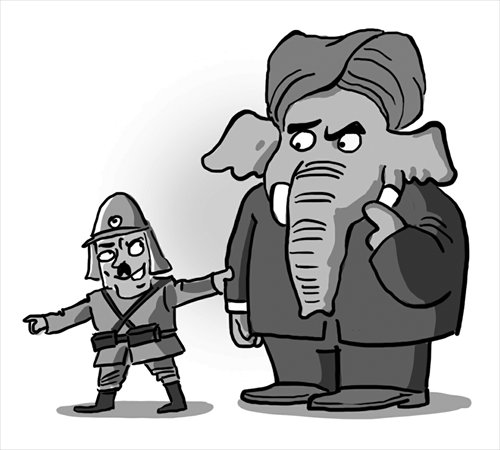Tokyo’s courting of New Delhi brings stronger defense ties

Illustration: Liu Rui/GT
That visits by Asian leaders to India, be it Chinese Premier Li Keqiang in May 2013 or Japanese Prime Minister Shinzo Abe in last month, evoke more interest across the world than those from European leaders is a sure sign of a changing international dynamic.
In the case of Abe, there was more than usual interest because the Japanese prime minister does not hide his intention to stitch a broader alliance in Asia, not necessarily against China but certainly designed to balance its rapid rise.
In December 2012, Abe wrote in a newspaper article: "Japan is a mature maritime democracy, and its choice of close partners should reflect that fact. I envisage a strategy whereby Australia, India, Japan, and the US state of Hawaii form a diamond to safeguard the maritime commons stretching from the Indian Ocean region to the Western Pacific."
Not surprisingly, one key element of the joint India-Japan statement during Abe's visit was preserving maritime freedom and respect for international laws in Asia. New Delhi and Tokyo reiterated their commitment "to the freedom of navigation, unimpeded commerce and peaceful settlement of disputes based on the principles of international law."
In the context of the rising tensions between China and Japan over island disputes and Beijing's assertiveness in the South China Sea, the reiteration is important.
For the first time the two have decided to step up their defense cooperation. Japan is in the advanced stage of talks to sell India the US-2 amphibious airplane. If it happens, this will be the first Japanese defense export since WWII.
New Delhi has also invited Tokyo to participate in the annual Exercise Malabar held between the US and the Indian navies. Last time Japan, along with Australia and Singapore, joined the maritime maneuver in 2007, Beijing protested vehemently.
Seven years down the line, China is unlikely to react as vociferously, judging by the measured response emanating from Beijing following the new India-Japan tango. Chinese Foreign Ministry spokesman Qin Gang told a media briefing in late January: "We hope that development of defense cooperation between both countries will be conducive to peace, stability and security of the whole region."
There is of course more to the Indian-Japanese relationship than just a desire to contain China. In the past five years, bilateral trade has increased by 80 percent, and currently is at $18 billion. Although this is nowhere near the bilateral trade between India and China, which is now inching toward $100 billion, Japan and India have set a goal of $25 billion this year.
With investments of $2.2 billion last year, Japan is now India's largest source of foreign direct investment, replacing the US.
The deepening of the India-Japan ties is being watched very keenly in the capitals of Vietnam, South Korea, Philippines and other smaller nations in Southeast Asia. With China's shadow looming large over the region, these countries have been searching for a "counterbalance" to Beijing.
While a formal alliance against Beijing looks unlikely, given differing perceptions and various levels of beneficial economic cooperation with China, most Asian nations would be happy to see an India-Japan partnership grow to maintain a strategic equilibrium in Asia.
This is especially important in the backdrop of recent events between Japan and China over the Diaoyu Islands dispute. The standoff over China's decision to enforce an Air Defense Identification Zone in the East China Sea appeared to show the limits of US intervention.
Perhaps realizing the folly of depending totally on the US for its security needs, Japan may step up efforts for a pan-Asian architecture to keep China in check given that the US has showed a reluctance to take China on directly, despite its much-discussed pivot or rebalance to Asia.
That said, New Delhi has so far refrained from articulating its view on the island disputes between China and other Asian nations. Perhaps 21st century diplomacy involves more hedging than ever before.
The author is security & strategic affairs editor with Indian broadcaster NDTV. opinion@globaltimes.com.cn